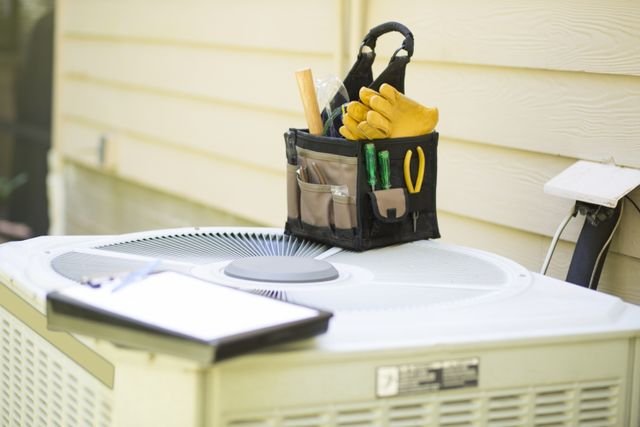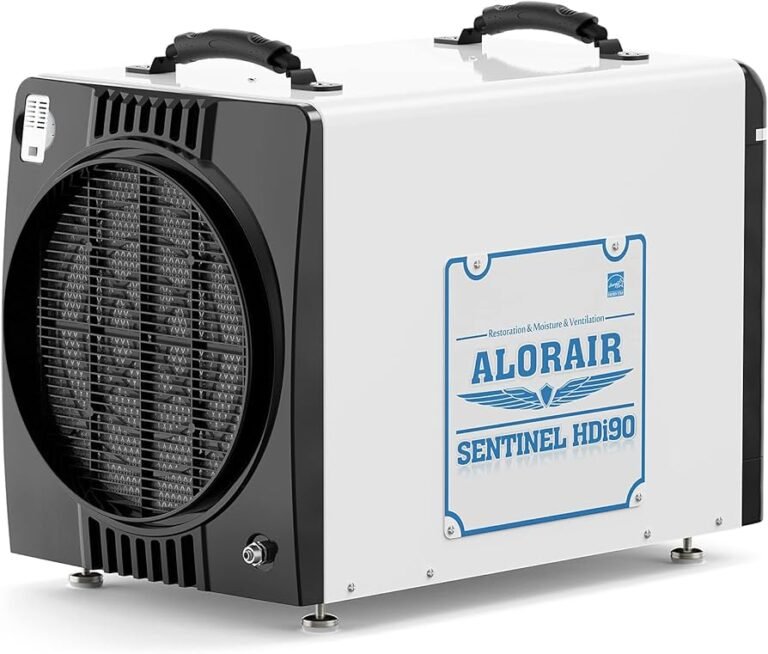Can I Use Any Capacitor for My AC Unit? Discover the Best Capacitors for Optimal Performance!
No, you cannot use any capacitor for your AC unit. The capacitor must match the electrical specifications of your AC unit for it to function properly and safely.
When it comes to your AC unit, using the wrong capacitor can cause severe damage, including overheating, motor failure, or even a complete system breakdown. AC units require specific capacitors that are designed to handle the voltages and currents required by the compressor motor.
Using a capacitor with incorrect values can result in inefficient operation, increased energy consumption, and potential safety hazards. Therefore, it is crucial to consult the manufacturer’s specifications or seek professional assistance to ensure the correct capacitor is used for your AC unit. By following these guidelines, you can optimize the performance and lifespan of your AC unit while minimizing the risk of expensive repairs or replacements.
What Are Ac Unit Capacitors?
AC unit capacitors are an essential component of any air conditioning system. They are responsible for storing and releasing electrical energy, which is critical for the overall functioning of the AC unit.
A capacitor is a device that consists of two conductive plates separated by an insulating material, known as a dielectric. When an AC unit is turned on, the capacitor charges by storing electrical energy. This stored energy is then released to help start the motor and provide a boost of power to the compressor.
The function of capacitors in AC units is twofold. First, they help provide the initial burst of power needed to start the motor. This is particularly important for motors with high starting torque requirements. Second, they help stabilize the electrical current flow by smoothing out the voltage fluctuations in the system.
It is crucial to use the correct capacitor for your AC unit, as using the wrong one can result in inefficient operation or even damage to the system. The correct capacitor specifications for your AC unit can usually be found in the manufacturer’s documentation or by consulting with a professional HVAC technician.
Types Of Ac Unit Capacitors
Can I Use Any Capacitor for My AC UnitTypes of AC Unit Capacitors:
| Capacitor Type | Description |
|---|---|
| Start Capacitors | Designed to provide an extra energy boost during startup, start capacitors are mainly used for AC units with single-phase motors. They help the motor reach its operating speed quickly. |
| Run Capacitors | Unlike start capacitors, run capacitors are continuously active throughout the operation of the AC unit’s motor. They help maintain a steady voltage and improve motor efficiency. |
| Dual Run Capacitors | These capacitors combine the functions of both start and run capacitors into a single unit. They are commonly used in AC units with dual motors, providing both startup energy and continuous operation support. |
It is important to note that not all capacitors are interchangeable. When replacing a capacitor for your AC unit, it is crucial to match the specifications and ratings of the original capacitor. Each AC unit has specific requirements for capacitors, including voltage rating, capacitance, and temperature range. Using an incompatible capacitor can lead to issues such as motor damage or inefficient operation.
If you are not sure about the appropriate capacitor for your AC unit, it is recommended to consult a professional technician or refer to the manufacturer’s guidelines. They can help you identify the correct capacitor type and ensure proper functioning of your AC unit.
Which Capacitor Is Right For Your Ac Unit?
Choosing the right capacitor for your AC unit is essential to ensure optimal performance and longevity. There are several factors to consider when making this decision.
Firstly, it’s important to check the compatibility of the capacitor with your specific AC unit. Different units have different electrical specifications, and using the wrong capacitor can lead to damage or inefficiency.
Secondly, you should consider the capacitance and voltage ratings of the capacitor. The capacitance determines the amount of energy the capacitor can store, while the voltage rating indicates the maximum voltage the capacitor can handle. Matching these ratings to your AC unit’s requirements is crucial for proper functioning.
In addition, you need to examine the size and physical compatibility of the capacitor. Ensure that it fits within the available space and can be safely installed in your AC unit.
Lastly, consulting a professional technician or referring to your AC unit’s specifications can provide valuable guidance in selecting the right capacitor for your specific needs.

Credit: www.amazon.com
Signs Of A Faulty Capacitor
One of the common issues that can occur in an AC unit is a faulty capacitor. It is important to identify the signs of a faulty capacitor to ensure proper functioning of the unit. Some symptoms of a faulty capacitor include the AC unit not turning on, the unit not cooling the space efficiently, or the unit making strange noises. These signs indicate that the capacitor may need to be replaced.
A faulty capacitor can have negative effects on the performance of the AC unit. It can lead to decreased cooling efficiency, increased energy consumption, and a shorter lifespan of the unit. Therefore, it is crucial to address any capacitor issues as soon as they are identified.
To determine if a capacitor is faulty, it is recommended to seek professional assistance from an HVAC technician. They have the knowledge and expertise to properly diagnose and resolve capacitor-related problems.
Importance Of Using The Correct Capacitor
Using the correct capacitor in your AC unit is of utmost importance. The capacitor plays a crucial role in the proper functioning of the unit, and using the wrong capacitor can have severe consequences.
When the wrong capacitor is installed, it can lead to various issues such as decreased cooling efficiency, higher energy consumption, and even damage to other components of the AC unit. The wrong capacitor can cause the unit to strain and work harder to maintain the desired temperature, leading to increased wear and tear.
On the other hand, using the correct capacitor offers several benefits. It ensures that the AC unit operates at optimal efficiency, providing you with effective cooling while consuming less energy. This not only saves you money on energy bills but also prolongs the lifespan of your AC unit.
It is essential to consult with a professional to determine the correct capacitor for your AC unit. They will consider factors such as the unit’s power requirements and electrical specifications to ensure the proper functioning and longevity of your AC unit.
Best Capacitors For Optimal Performance
When choosing a capacitor for your AC unit, it is crucial to opt for high-quality brands that offer reliability and durability. These reputable brands ensure smooth functionality and enhanced performance of your AC unit. Several capacitor features should be considered to ensure optimal performance.
| Feature | Description |
|---|---|
| Capacitance | Look for a capacitor with the appropriate capacitance level, as specified by the manufacturer. This ensures compatibility and proper functioning of the AC unit. |
| Voltage rating | Ensure that the capacitor has a voltage rating suitable for your AC unit. Choosing a capacitor with the wrong voltage rating can lead to performance issues or even damage to the unit. |
| Build quality | Opt for capacitors made with high-quality materials to ensure longevity and resistance to extreme conditions. Look for features like rust-proof casings and strong insulation. |
| Temperature rating | Consider the temperature rating of the capacitor. AC units face varying temperatures, so choosing a capacitor with a wide temperature range will provide stability and reliability. |
By focusing on these essential features, you can select the best capacitor for your AC unit that guarantees optimal performance and a prolonged lifespan.
Proper Installation And Maintenance Of Capacitors
Capacitors play a crucial role in the functioning of AC units, so it is essential to ensure their proper installation and maintenance. Here are some instructions for installing capacitors:
- Turn off the power supply before installing the capacitor to prevent any electrical hazards.
- Identify the correct terminal connections and make sure to connect the capacitors properly.
- Secure the capacitor in place using appropriate mounting brackets or straps.
- After installation, double-check all the connections and ensure they are tight and secure.
Maintaining capacitors is equally important to ensure the longevity and efficiency of your AC unit. Here are some tips:
- Regularly inspect the capacitors for any signs of leakage, bulging, or physical damage.
- Keep the capacitors clean and free from any dust or debris accumulation.
- Monitor the capacitance levels using a meter and compare them with the manufacturer’s recommendations.
- If you notice any abnormal behavior or reduced performance of your AC unit, consider having the capacitors professionally tested and replaced if necessary.
Professional Assistance For Capacitor Issues
When it comes to the functioning of your AC unit, capacitors play a crucial role. These small devices store and release electrical energy, ensuring the smooth operation of your AC system. However, capacitor issues can sometimes arise, impacting the performance of your unit.
If you notice any signs of a faulty capacitor such as frequent system breakdowns, reduced cooling efficiency, or unusual noises, seeking professional assistance is crucial. Hiring an experienced technician is important for several reasons:
| Expertise: HVAC technicians have the knowledge and expertise to diagnose capacitor issues accurately. They can identify whether the problem lies with the capacitor itself or with other components of the AC unit. |
| Quality Repairs: Professionals can provide quality repairs, ensuring that the capacitor is replaced or repaired correctly. This helps prevent further damage to the unit and extends its lifespan. |
| Safety: Capacitors store electrical energy, which can be dangerous if mishandled. Professional technicians have the necessary skills and equipment to handle capacitors safely, reducing the risk of accidents or injuries. |
So, if you encounter any capacitor issues with your AC unit, it’s best to leave the task to the professionals. They will provide the necessary expertise, quality repairs, and ensure your safety throughout the process.
Frequently Asked Questions On Can I Use Any Capacitor For My Ac Unit
Can I Use Any Capacitor For My Ac Unit?
No, you cannot use any capacitor for your AC unit. It is important to use the correct capacitor that is compatible with your specific AC unit. Using the wrong capacitor can result in damage to your unit and may require costly repairs.
Always consult the manufacturer’s specifications or consult with a professional technician for the correct capacitor for your AC unit.
Conclusion
The type of capacitor you use for your AC unit is crucial for its performance and longevity. Choosing the right capacitor that meets the specifications of your AC unit is essential to prevent any potential damage. By consulting with a professional or referring to your AC unit’s manual, you can ensure that you select the appropriate capacitor.
Investing in the correct capacitor will ultimately enhance the efficiency and reliability of your AC unit.






